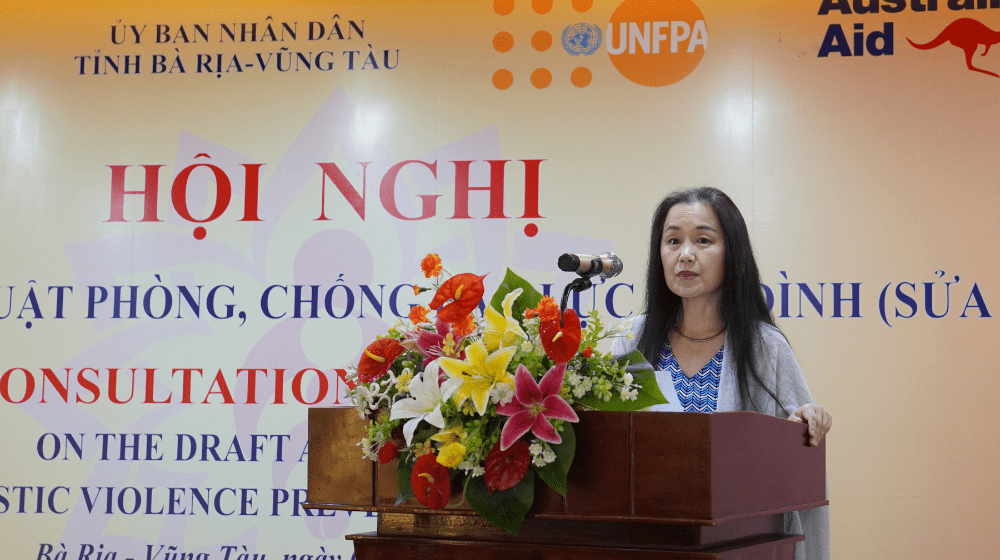Excellency Ms. Trinh Thi Thuy, Vice Minister of Culture, Sports and Tourism;
Representatives from the Peoples’ Committees, Peoples’ Assemblies, the Provincial Departments of Culture, Sports and Tourism (DOCST) from southern provinces;
Members of the DVPC rafting committee and experts;
My UNFPA colleagues and media.
It is an honor for me to join Mme Trinh Thi Thuy today to chair the consultative workshop to discuss the draft amended Law on Domestic Violence Prevention and Control. This is an excellent opportunity for representatives from the southern provinces to share perspectives in addressing domestic violence, particularly violence against women, children, people with disabilities and the elderly.
The draft amended DVPC Law has gone through many technical meetings and consultative workshops with line ministries, experts in this field, and CSOs. The revised Law consists of 6 chapters, 62 articles with 24 new articles, and 38 supplement articles. Currently, the revised DVPC Law is being elaborated by the National Assembly for review towards adoption in October 2022.
May I take this opportunity to recall the fact that Viet Nam’s endorsement of the Domestic Violence Prevention and Control Law in 2007 showed the country’s strong commitment and remarkable efforts in addressing domestic violence. The Law has created a solid legal framework for the development as well as for the implementation of many policies and interventions in the last two decades.
In 2016, with technical support from UNFPA, the Ministry of Culture, Sports and Tourism conducted an independent review of the 10-year implementation of the 2007 Domestic Violence Prevention and Control Law, focusing on three areas: (i) the law enforcement and involvement by relevant stakeholders; (ii) the consistency of the law with international treaties; and (iii) the consistency of the law with other related laws and policies in Viet Nam. The review identified recommendations to revise the DVPC Law based on human rights and the GBV survivor–centered approach, and to include other forms of violence against women and girls (VAWG) outside of the family setting, provide essential and integrated services including health, counselling, police protection, social and justice services, and transform awareness-raising communication campaigns towards actual behavior change of people.
Dear participants,
The findings of the UNFPA-supported 2019 National Study on Violence against Women in Viet Nam showed little change in terms of prevalence of violence, compared to the 1st study conducted in 2010. This is very disappointing. According to the 2019 Study, 62.9 percent of women in Vietnam experienced one or more forms of physical, sexual, emotional and economic violence, and controlling behaviours by their husband in their life time. Violence is hidden in Vietnam’s society, as 90.4 percent of gender-based violence survivors did not seek any help from authorities and half of them never told anyone about the violence. Furthermore, violence against women is costing the country 1.81% of GDP. And this is an alarming issue. The recommendations arising from the 2019 National Study also highlighted the need to review, amend and revise the existing national policies and relevant laws, including the Domestic Violence Prevention and Control Law, to ensure its compliance with international obligations and standards.
Over the years, UNFPA has been supporting the Ministry of Culture, Sports and Tourism for the revision of the Law to incorporate all recommendations from previous studies and ensure international standard and commitments on the prevention and response to domestic violence.
UNFPA also assisted the Ministry to develop a dossier of the proposals for the amendment of the Law as an official submission to the National Assembly. It includes three review reports, namely the Review on Gender Assessment, Review on International Experience on Domestic Violence Prevention and Control Laws and lessons learned for Viet Nam, and Review on Viet Nam’s existing laws and policies relating to the Domestic Violence Prevention and Control Law.
As the National Assembly is discussing the revised Law, the consultative meeting today aims at elaborating it further from the perspectives of local authorities from the southern provinces and cities.
In light of this, your comments and suggestions on the new Law are extremely valuable towards the National Assembly’s approval in October 2022. We must not leave anyone behind in Viet Nam’s sustainable development process, and that includes survivors of violence and those most at risk of violence.
Thank you very much for your attention and participation today!


